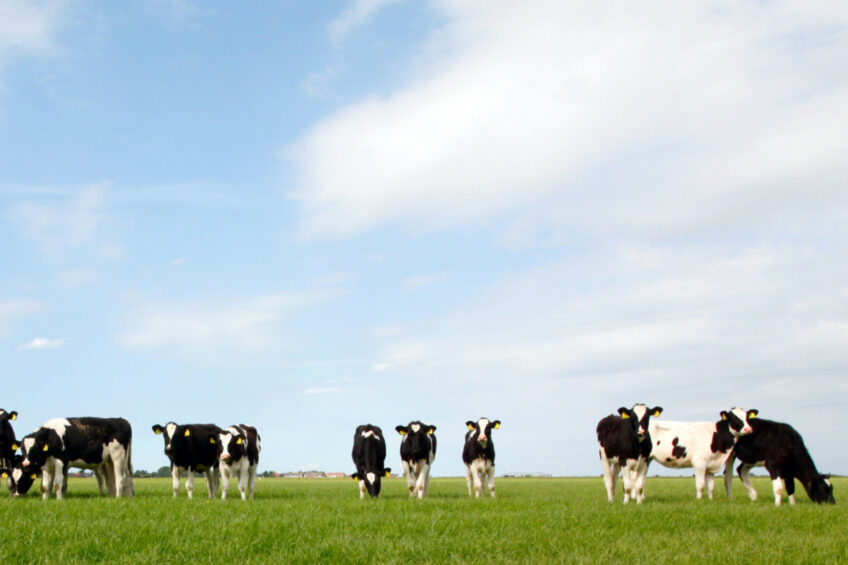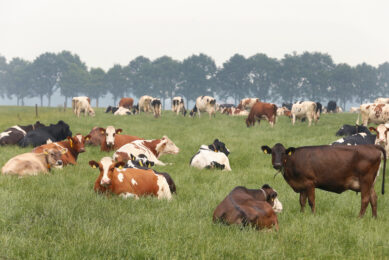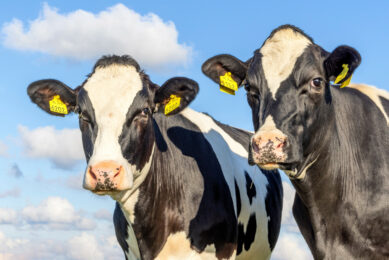Amazon boss pledges millions to reduce cattle methane emissions

Amazon boss Jeff Bezos has pledged millions of dollars into research to significantly cut methane emissions from cattle using a number of intervention methods, including vaccines.
Livestock are responsible for producing around one third of all global methane emissions, which continue to warm up the atmosphere at an alarming rate. The multi-billionaire is therefore providing a US$9.4 million grant, via his Bezos Earth Fund, to a collaboration between The Pirbright Institute and the Royal Veterinary College in the UK. The research project will use biotechnology to determine the mechanism by which a vaccine could cut livestock methane emissions by more than 30%.
Genetics, feed, management practices, and vaccines
According to the Global Methane Hub, reducing methane emissions by 45% this decade could deliver a cooling effect of approximately 0.3°C by 2040. The Bezos Earth Fund, together with the Global Methane Hub, have a portfolio of grants looking to reduce these emissions through low-methane genetics, improved feed, and better ranch management practices.
All of these approaches can play a role in specific geographies and ranch-types. However, a vaccine would offer a universal solution and can be integrated into existing farm management systems, which is both scalable and cost effective.
Dr Andrew Steer, president and CEO of the Bezos Earth Fund, said: “Vaccines have proven to be incredibly effective in global health, and if we can apply this approach to cattle, the potential for reducing emissions is immense. The Bezos Earth Fund is committed to high-risk, high-reward projects like this, which have the power to transform our efforts against climate change.”
Immune and antibody response
The project comprises 2 key components, each tackling different aspects of the challenge. The first is the early development of immune response. Researchers at the Royal Veterinary College, in collaboration with Consejo Superior de Investigaciones Científicas (CSIC), will study how and when methane-producing microbes (methanogens) colonise the digestive tract of calves and how the immune system responds. Advanced techniques such as multi-omics, histology, and immunology will be used to gain insights into these early interactions. They will also develop methanogens with fluorescent markers to track microbial interactions.
The second main phase is antibody response and vaccine development. Scientists from The Pirbright Institute and AgResearch will identify and characterise specific antibodies needed to target methanogens effectively.
This involves isolating antibodies from immunised cattle and testing their effectiveness in lab conditions. By driving cross-reactive antibody responses and generating panels of antibodies, researchers aim to establish a proof of concept for a methane vaccine.
The project aims to overcome significant scientific hurdles, providing a foundation for a global methane vaccine initiative. If successful, this could revolutionise the way methane emissions are managed in agriculture, offering a viable solution to one of the largest sources of greenhouse gases.
Professor John Hammond, immunogenetics group leader at The Pirbright Institute, said: “We’re not developing a methane vaccine per se, but rather defining what a successful vaccine needs to achieve. By understanding the precise antibody responses required, we can provide a clear path forward for vaccine development. This approach reduces the trial-and-error aspect and focuses on targeted, high-resolution immunology.”
Knowledge gaps
Current knowledge gaps include understanding how antibodies inhibit methanogen growth, identifying effective vaccine-induced antibodies, and determining specific methanogen surface antigens. By addressing these gaps, the project aims to guide the development of an effective methane vaccine.
Dr Dirk Werling, professor of molecular immunology at the Royal Veterinary College, added: “Understanding the early colonisation of methanogens and the immune response is crucial. Our work aims to provide the foundational knowledge needed to develop effective interventions. By combining our efforts with Pirbright and CSIC, we’re making strides toward a sustainable solution.”
Research findings to practical solutions
Developed in collaboration with the Global Methane Hub’s Enteric Fermentation R+D Accelerator, this project brings together international experts to accelerate the translation of research findings into practical solutions. The collaboration between The Pirbright Institute, the Royal Veterinary College, CSIC, and AgResearch in New Zealand exemplifies a coordinated effort to tackle a major environmental challenge.
According to the Bezos Earth Fund, by supporting this pioneering research, it is taking a bold step toward innovative solutions for climate change. This project, described as a ‘moonshot’ by the researchers, represents a high-risk, high-reward venture that could lead to planetary-level impacts if successful.
Join 13,000+ subscribers
Subscribe to our newsletter to stay updated about all the need-to-know content in the dairy sector, two times a week.










